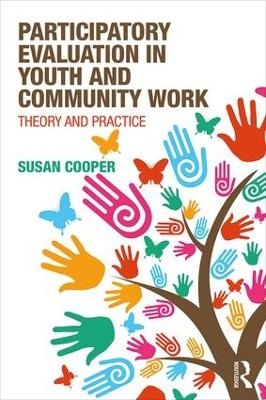
Participatory Evaluation in Youth and Community Work
Routledge (Verlag)
978-1-138-18438-1 (ISBN)
Evaluation is an essential element of professional practice. However, there is little in the literature that is designed to help students involve and support young people in evaluating the impact of youth work activities. This comprehensive book explores current thinking about evaluation in the context of youth work and community work and offers both theoretical understanding and practical guidance for students, practitioners, organisational leaders and commissioners.
Part 1 provides underpinning knowledge of the origins, purpose and functions of evaluation. It charts the developments in evaluation thinking over the past 50 years, and includes an exploration of ‘theory of change’. Concepts such as impact, impact measurement and shared measurement are critically examined to illustrate the political nature of evaluation. Findings from empirical research are used to illuminate the challenges of applying a quasi-experimental paradigm of evaluation of youth and community work. Part 2 introduces the reader to participatory evaluation and presents an overview of the histories, rationale and underpinning principles. Empowerment evaluation, collaborative evaluation and democratic evaluation are examined in detail, including practice examples. Transformative Evaluation, an approach specifically designed for youth and community work, is presented. Part 3 focuses on the ‘doing’ of participatory evaluation and offers guidance to those new to participatory evaluation in youth and community work and a helpful check for those already engaging. It provides valuable information on planning, methods, data and data analysis and processes for sharing knowledge.
This essential text will enable the reader to reconstruct evaluation as a tool for learning as well as a tool for judging value. It provides a comprehensive reference, drawing on a wide range of literature and practice examples to support those involved in youth and community work to develop and implement participatory approaches to evaluating and communicating the meaning and value of youth and community work to a wider audience.
Susan Cooper was a youth worker and a youth work manager for thirty years before joining Plymouth Marjons University, UK, as a senior lecturer and Programme Leader for undergraduate and postgraduate Youth and Community Work courses. She developed her expertise in participatory evaluation during her doctoral studies and has supported a range of youth work organisations in the UK and across Europe to develop their use of participatory evaluation.
Introduction; What is youth work?; What are youth work outcomes?; Overview of book; PART I. Evaluation: Nature, Politics and Tensions; Chapter 1: What is Evaluation?; Unpacking ‘evaluation’; What is evaluation for?; Different paradigmatic approaches; The evolving nature of evaluation; Introducing ‘Theory of Change’; The problem with evaluation; Chapter 2: The Politics of Evaluation; The political context; Understanding ‘impact’; Shared measurement; What counts as ‘evidence’?; Chapter 3: Practitioners’ Tensions and Dilemmas; Generating data replaces ‘real’ work; Accounting systems are reductionist; Funder-led practice; Tensions between targets and authenticity; Tensions between targets and values; PART II. Participatory Evaluation; Chapter 4: What is Participatory Evaluation?; Defining participatory evaluation; Underpinning philosophy and values; Developments in participatory evaluation; Participation and empowerment; Models of participation; Making the case for participatory evaluation in youth and community work; Chapter 5: Participatory Evaluation Approaches; Similarities and distinguishing features; Empowerment evaluation; Empowerment evaluation in practice; Collaborative evaluation; Collaborative evaluation in practice; Democratic evaluation; Democratic evaluation in practice; The challenges associated with stakeholder involvement; Chapter 6: Transformative Evaluation; Rationale; Theoretical foundations; Transformative evaluation in practice; The four stages of Transformative Evaluation; Challenges associated with transformative evaluation; Tried and tested; Chapter 7: Learning in Participatory Evaluation; Learning and accountability: A dichotomy?; Learning in evaluation; Five types of ‘process use’; Learning in the moment; Learning through collective reflection; Empowerment; PART III. Participatory Evaluation in Practice; Chapter 8: Preparing for Evaluation; Clarifying and articulating purpose; Developing a theory of change; Considering ethics; Engaging stakeholders; Resources; Chapter 9: Data in Participatory Evaluation; Who ‘generates’ data?; What data are needed?; Quantitative and qualitative data; Issues of trustworthiness in participatory evaluation; Factors influencing decisions about data generation methods; Chapter 10: Methods for Generating Data; Questionnaires; Interviews; Observation; Story-telling; Chapter 11: Analysing Data; Approaches to data analysis; Analysing quantitative data; Analysing qualitative data; Content analysis; Coding data and generating themes; Content analysis in Transformative Evaluation; Involving stakeholders in data analysis; Chapter 12: Sharing Knowledge; Voice, audience and message; Writing an evaluation report; Other forms of sharing knowledge; Meta-evaluation: Sharing learning about evaluation; Conclusion; Index
| Erscheinungsdatum | 21.12.2017 |
|---|---|
| Zusatzinfo | 19 Tables, black and white; 8 Line drawings, black and white; 8 Illustrations, black and white |
| Verlagsort | London |
| Sprache | englisch |
| Maße | 156 x 234 mm |
| Gewicht | 596 g |
| Themenwelt | Sozialwissenschaften ► Pädagogik ► Sozialpädagogik |
| Sozialwissenschaften ► Soziologie | |
| ISBN-10 | 1-138-18438-1 / 1138184381 |
| ISBN-13 | 978-1-138-18438-1 / 9781138184381 |
| Zustand | Neuware |
| Haben Sie eine Frage zum Produkt? |
aus dem Bereich


